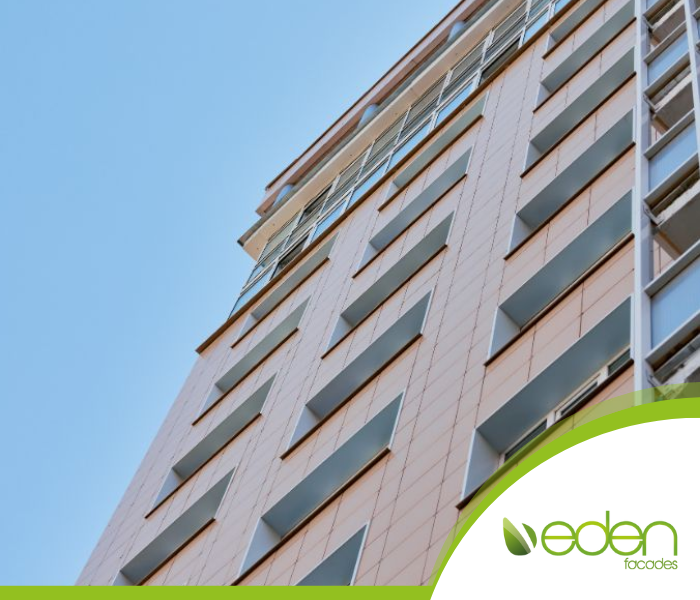The building sector is one of the most significant contributors to global energy consumption and greenhouse gas emissions, accounting for 32% of global energy use. This underscores the urgent and crucial need for more sustainable approaches to construction and design.
One key component in achieving energy efficiency and meeting environmental targets, such as net-zero goals and the Future Homes Standard, is the building façade. It acts as the first line of defense against external elements like heat, cold, wind, and moisture, playing a vital role in creating energy-efficient buildings.
In this article, we explore how façades are essential to sustainable design strategies and contribute to the development of energy-efficient buildings for the future.
Deflecting solar heat gain
In hot or mixed climates, controlling solar gain is crucial for maintaining comfortable indoor temperatures without excessive reliance on energy-intensive air conditioning systems. Regulatory updates introduced in 2022 revised Building Regulation Part O, which addresses solar heat gain and overheating, which may require shading solutions to minimise unwanted solar radiation and support the UK’s goal of reaching net-zero carbon emissions by 2050.
Façades incorporating shading devices such as Brise-Soleil louvres or vertical fins can significantly reduce solar heat gain.
A notable example is the Treadgold project, where Eden Facades has installed Brise-Soleil louvres. These horizontal slats are strategically positioned on the sun-facing façade to block high-angle summer sun, allowing lower-angle winter sun to enter. This design approach helps regulate indoor temperatures, enhances occupant comfort, and reduces cooling loads and energy consumption, making it an effective solution for energy-conscious design.
Insulation: Creating a high-performance thermal envelope
A well-insulated façade is essential for energy efficiency. Thermal insulation reduces unwanted heat transfer between indoor and outdoor environments, retaining warmth in winter and keeping heat out in summer. This directly decreases the need for mechanical heating and cooling, lowering energy bills and reducing carbon emissions.
External Wall Insulation (EWI) is particularly effective. According to the Energy Saving Trust, properly installed EWI can reduce heating costs by 20-30%, significantly boosting the energy performance of both new builds and retrofit projects.
When paired with rainscreen cladding systems, insulation becomes even more effective. Rainscreen cladding creates a ventilated cavity between the external layer and the insulation, allowing moisture to escape while protecting the building envelope from weather-related damage. This combination improves thermal performance and contributes to the structure’s durability, reducing the risk of condensation and mould.
Discover how rainscreen cladding supports sustainability in ‘The important role of rainscreen cladding in achieving sustainability goals’.
Ventilation and airflow
Modern façade design also considers natural ventilation. Operable windows, louvres, and vents can be strategically integrated into the building envelope to facilitate fresh air circulation, enhancing indoor air quality and reducing reliance on air conditioning.
Advanced mechanical ventilation systems, especially those in Passivhaus buildings, often include heat recovery units. These systems recover heat from exhaust air and use it to preheat incoming fresh air, substantially lowering energy use while maintaining high ventilation standards.
Passivhaus standards
Passivhaus developments are designed to conserve energy rather than generate it. They set industry-leading benchmarks for insulation and energy performance. Passivhaus buildings are ultra-low energy, requiring minimal heating or cooling while maintaining exceptional year-round thermal comfort. These buildings are crucial in achieving net-zero goals and are becoming increasingly common in the UK.
Façade installation is key to supporting these standards. When systems like rainscreen cladding and EWI are installed by skilled professionals, they significantly enhance the building’s energy efficiency.
Façades: Integral to sustainable architecture
While façades contribute to a building’s visual appeal, their role in creating energy-efficient, sustainable buildings is even more significant. Tony Hill, Managing Director at Eden Facades, explains:
“Expertly installed façade systems can deliver excellent thermal efficiency and protect against excess heat. Poorly fitted systems will underperform in terms of all energy efficiency benefits. We have proven experience providing various solutions that meet project energy efficiency goals, such as our recent involvement at Deben Fields in Felixstowe, a Passivhaus project.”
By integrating shading devices, high-performance insulation, and intelligent ventilation strategies, façades can drastically reduce energy consumption, improve comfort, and help combat climate change. As we progress towards net-zero targets, façades will remain at the forefront of energy-efficient, environmentally responsible architecture.
Need façade expertise? Get in touch with us at 01268 744199 or email office@edenfacades.co.uk

